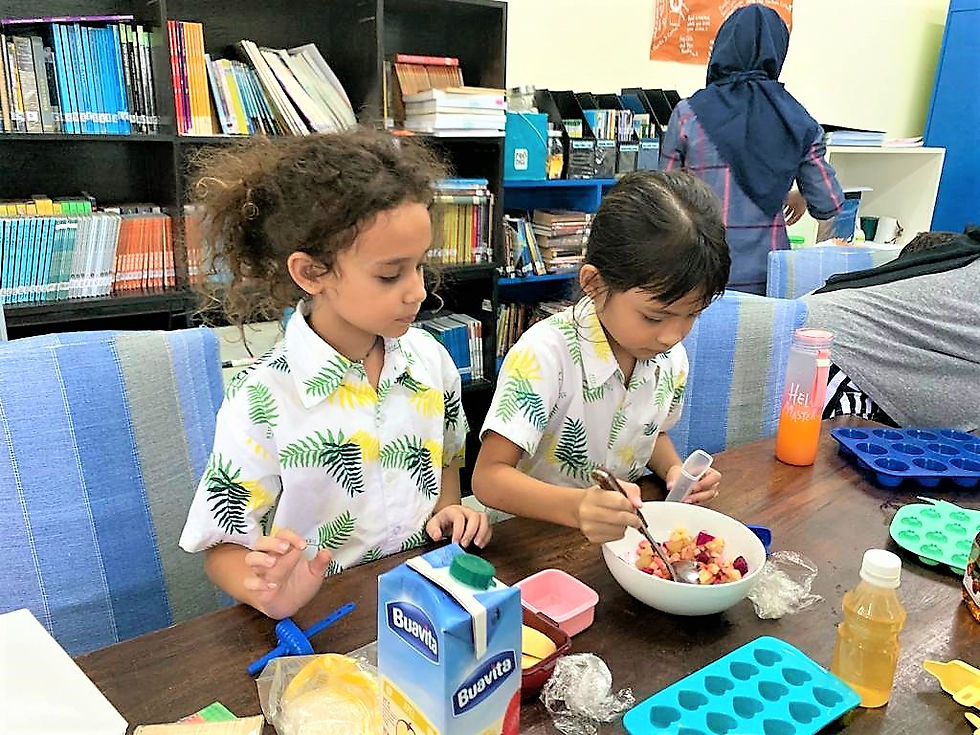Tips to Support your Child’s Home Learning
- The New Zealand School Jakarta
- Jul 9, 2020
- 2 min read

During quarantine and school closures, learning from home can be very challenging for children and families. Firstly, it is important to acknowledge that this is not traditional ‘homeschooling’ or simply ‘online learning’ that some families have been doing way before this pandemic arrived and flipped our lives upside down. As a society, we have been forced to isolate and break away from our usual routines. Children don’t have the usual physical activity, social interactions or leisure activities that they usually have. Parents may still have to work while at the same time, be with their children and build new habits for them to learn at home. In addition, some families may be dealing with health and financial stresses too.
Children generally associate home with spending time with family, playing games, sleeping, eating, watching television or relaxing. They have suddenly been asked to think of home as a place where their formal education takes place too. This psychological leap is difficult and can make it challenging for children to stay engaged and focused to learn. When schools and educators plan how to continue their academic programme and support children’s learning and development remotely, these factors should all be taken into consideration and families should find the best approach that works for them. Here are 8 tips for parents to support your child’s home learning and keeping them engaging:
Prioritise wellbeing. Learning is best when children feel safe, secure and happy.
Establish a routine that works for your family. This helps to organize the day and create some structure that children are used to having.
Don’t put pressure on yourself or your children. Be flexible and don’t worry if the day isn’t going according to plan.
Encourage exercise and movement breaks. Physical activity is very important for physical and mental health.
Stay connected.. with your child’s teacher, with their friends. Parents should also reach out to other adults and other parents to share their experiences and challenges.
Reduce Distractions. Create a workspace and learning environment that is comfortable and is used for the purpose to learn and do school work.
Provide an element of choice. Give children the opportunity to make choices and let them be involved in the decision making process.
Use a checklist or visual aids. Some children benefit from seeing the schedule in front of them or have a series of tasks they can cross off or remove once completed.
If you would like some guidance or resources for supporting your child’s learning at home, contact us at info@nzsj.sch.id or call us on +62 813 1196 3782 and we will set up a personal meeting with a member of our academic team.


The Christmas Outfits Sale is here, bringing you incredible discounts on festive and stylish ensembles for the holiday season! Whether you’re looking for cozy sweaters, chic dresses, or sharp suits, this sale has everything you need to celebrate in style. Complete your look with accessories or pair your outfit with timeless pieces like a sleek leather jacket to make a statement. Don’t miss the chance to refresh your wardrobe—shop the Christmas Outfits Sale now and shine this holiday season!
The Christmas Suit Sale is your chance to shine this holiday season with elegant and perfectly tailored suits at amazing prices! Whether you're attending festive parties, family dinners, or end-of-year celebrations, our collection offers something for every occasion. Featuring premium fabrics, classic cuts, and a variety of sizes, these suits combine style and comfort effortlessly. Don’t miss this opportunity to elevate your holiday look—shop the Christmas Suit Sale today and celebrate in style!
teri medan
teri basah
teri nasi
teri nasi
teri medan
oleh oleh
teri medan